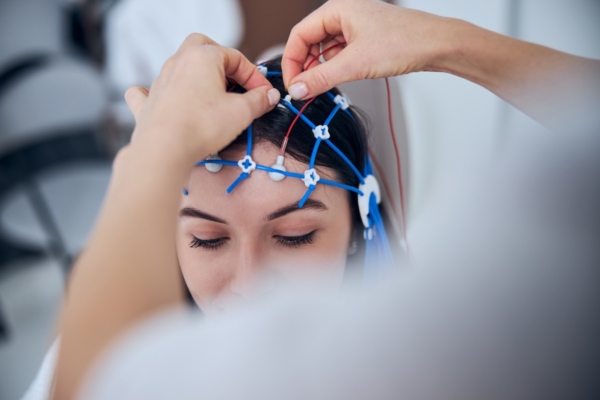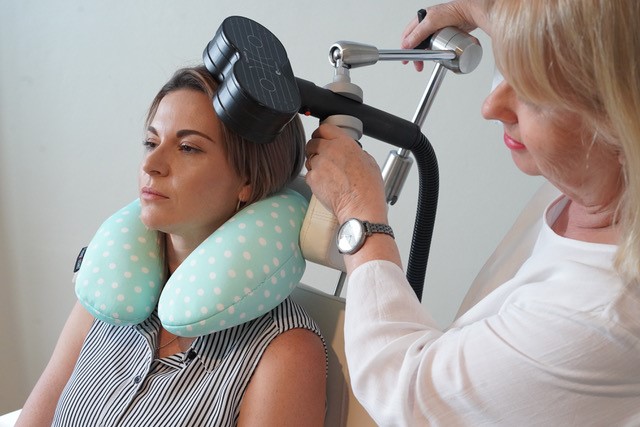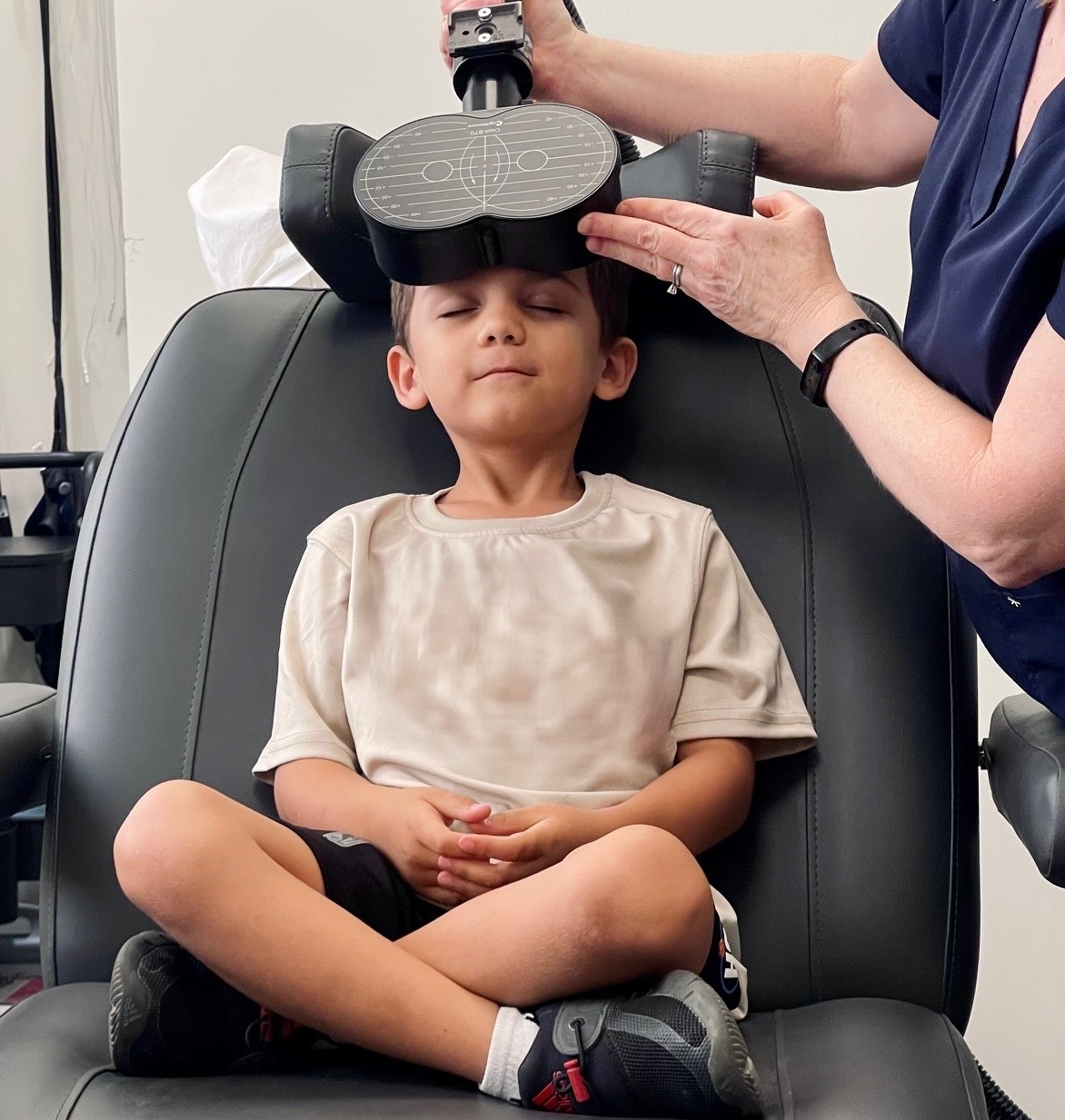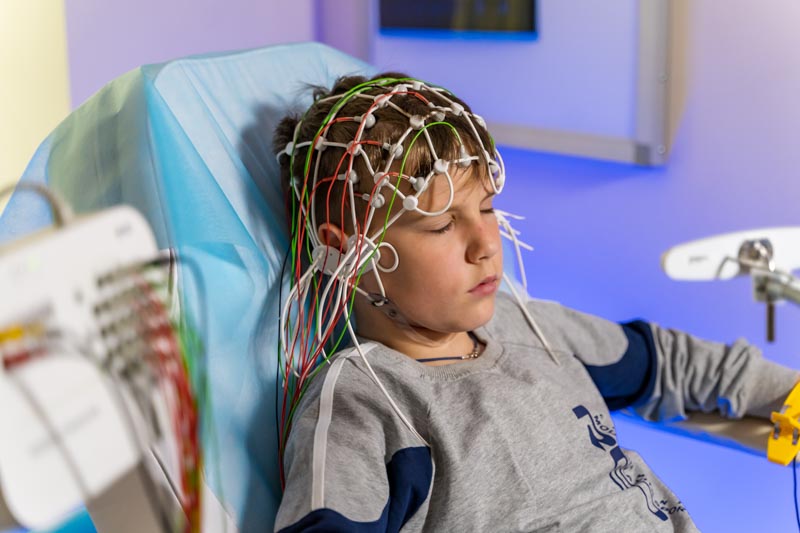Magnetic Resonance Therapy (MeRT)
MeRT, short for Magnetic Resonance Therapy, is bringing a radical change to brain health. The field of neuroscience has witnessed remarkable strides in understanding the complex functioning of the human brain. As a result of these advancements, MeRT has become a game-changer therapy promising to revolutionize our approach toward brain health and treatment for various neurological conditions. This groundbreaking therapy utilizes advanced technology in neuroscience to optimize brain function efficiently. It unlocks new possibilities for individuals suffering from conditions such as depression, anxiety, and PTSD, besides aiding in the recovery from a traumatic brain injury.
For the treatment of Autism Spectrum Disorder (ASD), a recent study published in Child Psychiatry & Human Development in November 2022 revealed the use of MeRT in children, aged 3-9 years old, with Autism Spectrum Disorder had significant improvement in ASD symptoms especially sleep troubles and quality of life. MeRT surely promises a brighter tomorrow for those struggling with such neurological conditions. MeRT is a non-invasive neurotherapy that utilizes magnetic fields to stimulate specific areas of the brain. The foundational principle of neuromodulation involves modifying neural activity to positively influence brain function, and that’s exactly what this therapy accomplishes. By combining the power of repetitive Transcranial Magnetic Stimulation (rTMS) with the diagnostics of quantitative electroencephalography (qEEG), MeRT provides personalized treatment plans that can help you feel your best again.
 The therapy commences with a comprehensive evaluation of your brain activity using a qEEG, a brain scan. This painless procedure measures electrical activity in your brain to pinpoint irregular patterns and areas of dysfunction. This process helps our clinicians identify the precise regions and patterns to be targeted for treatment. MeRT then combines this mapping data with rTMS, a technique that involves delivering gentle magnetic pulses to specific brain regions to stimulate neuronal activity and connectivity.
The therapy commences with a comprehensive evaluation of your brain activity using a qEEG, a brain scan. This painless procedure measures electrical activity in your brain to pinpoint irregular patterns and areas of dysfunction. This process helps our clinicians identify the precise regions and patterns to be targeted for treatment. MeRT then combines this mapping data with rTMS, a technique that involves delivering gentle magnetic pulses to specific brain regions to stimulate neuronal activity and connectivity.
MeRT therapy is a non-invasive, medication-free TMS treatment. It is offered exclusively at TMS Institute of Arizona, in partnership with Brain Treatment Center. Schedule a thorough evaluation by calling 480-448-2916. With zero downtime, this exceptional therapy delivers extraordinary benefits. MeRT is leading a neurotherapeutic revolution, offering new hope for those dealing with mental health disorders and neurological conditions, and those pursuing peak performance.
By uniting cutting-edge technology with neuroscience, this non-invasive therapy gently stimulates the exact right areas of the brain to optimize function, rewire neural circuits, and enhance overall well-being. As research continues, MeRT holds the promise of transforming brain health and opening doors to a future where neurological conditions no longer limit a fulfilling life. As MeRT gains recognition and undergoes further research, its potential applications expand. Studies are exploring its efficacy in treating neurodegenerative disorders such as Alzheimer’s and Parkinson’s disease, chronic pain conditions, and addictive disorders. Furthermore, ongoing advances in technology and neuroscience will continue to refine and improve MeRT protocols, making the therapy even more tailored and effective. MeRT’s non-invasive nature, minimal side effects, and ability to promote neuroplasticity make it an attractive option for patients seeking a more innovative treatment.

Call 480-448-2916 for more information.
Brain Treatment Center in Scottsdale, AZ
Disorders that may be treated with MeRT
MeRT can be used to treat a variety of conditions, including Autism Spectrum Disorder, Depression, Post-traumatic stress disorder (PTSD), Sports Recovery / Traumatic head injuries, and more.
How MeRT Transforms Brain Health
Mental Health Disorders: MeRT has exhibited astonishing potential in treating mental health ailments like depression, anxiety, and post-traumatic stress disorder (PTSD). By precisely targeting afflicted brain regions, MeRT helps restore neural equilibrium, alleviate symptoms, and improve overall well-being. Unlike conventional treatments, it offers a non-invasive and drug-free alternative that demonstrates promise in even the most recalcitrant cases.
Neurological Conditions: MeRT holds immense promise in treating several neurological conditions, including traumatic brain injuries (TBI), strokes and neurodevelopmental disorders like Autism Spectrum Disorder (ASD). By stimulating and rewiring neural pathways, intranasal MeRT aids in enhancing cognitive function, motor skills and overall neurological resilience. Individuals seeking to regain lost functions and improve their quality of life can benefit significantly from this novel therapy. With seamless integration into existing treatment plans, MeRT opens new pathways towards recovering lost neurological abilities and increasing cognitive capacity.
Performance Optimization: MeRT is no longer limited to therapeutic uses, as it garners increasing interest in the performance optimization realm. Be it athletes, professionals, or anyone striving for peak cognitive abilities, MeRT is now the go-to solution. Through expertly tweaking neural circuits and optimizing brain functionality, MeRT unlocks unparalleled potential. Users achieve augmented cognitive capabilities including better focus, enhanced creativity, sharper memory, and improved decision-making prowess.
How MeRT Works
MeRT treatment begins with a quick 10-minute brainwave recording. This is the qEEG, coupled with an electrocardiogram (ECG), to measure your brainwave frequencies, heart rate, and the relationship between brain and heart.
Next, your clinician re-processes the data via a database with more than 30,000 other brainwave recordings. This is how your unique brain image is translated into a report that provides insight via comparison and matching. At this point, it can be determined if some areas of your brain are not functioning as they should. When this happens, a custom treatment plan is created.


The third step is personalized brainwave stimulation. Your unique protocol is based on your brainwave recordings and is delivered via MeRT.
Everyone’s protocol may vary, but MeRT sessions can occur as often as daily. Typically, 15-30 minute sessions five days per week for 4-6 weeks is the most common protocol.
After ten sessions are complete, your clinician performs a brainwave recording re-assessment to assess for positive changes in brain activity and for any updates to the treatment protocol. A third 10-minute brainwave recording session will be required after completing four weeks of therapy to again reassess for positive changes in brain activity. Combined with questionnaires and assessments, we will work together to gauge the effectiveness of the treatment and determine if additional treatment sessions are needed.
Call 480-448-2916 for more information.
Hear what just a few MeRT Patients have experienced.
Depression Treatment “I felt like I was alone even though I was surrounded by love and care. It was just a cloud that would linger over my life every now and again. MeRT helped me better understand what was going on in my head and after a month of treatment, I was grateful to be depression-free and medication-free for the first time in years.”
Depression Treatment “For anyone suffering from depression, anxiety, and other symptoms, I highly recommend trying MeRT. My adult son, who has suffered from both problems his entire life, and has been on medication, realized a positive change after the first visit. We saw dramatic improvement after each visit. This technology is truly a magic bullet.”
Post-traumatic Stress Disorder (PTSD) Treatment “THANK YOU SO VERY MUCH for your help with TMS/MeRT for my PTSD symptoms! The confusion, distraction, and memory issue was greatly reduced. The treatment does wonders. “And whatever you did last time had an unexpected, incredibly wonderful effect. Besides helping with my sciatic, shoulder, and leg pains, I stopped taking oxy. Now, while I do have some pain, I take no opioids! I manage with ibuprofen, and Tylenol. This is worth every penny. THANK YOU!”
Autism Treatment “After trying various treatments and conducting thorough research, we decided to travel from our home to the Brain Treatment Center. It was the BEST decision we could have made for our six-year-old son, who has severe apraxia and is on the spectrum. “After six weeks of MeRT treatment, our son said his name for the first time! He has been more flexible in his daily schedule, OCD tendencies have lessened tremendously, and he does not become as anxious as he had previously experienced in new places and surroundings. “We cannot thank the doctor and staff enough for the kindness, care, and genuine concern they have shown (and continue to show) our son and our family. They are always available for questions and concerns, and they truly support all patients and their families. For our family, MeRT and the Brain Treatment Center have been a journey worth the endeavor!”
Autism Treatment “It was a great experience with a very friendly and professional staff! When we first brought our child to the clinic, we expected some progress with her speech skills, but we ended up getting results in other unexpected areas. The first change we saw with our daughter was that she started to make eye contact — then she started to be more aware of her surroundings. Second, she stopped stemming, and that was the biggest change for her. Third but not least, she started to socialize and play with other children!”
Traumatic Brain Injury (TBI) Treatment “In the ensuing months after the concussion, I just wasn’t myself. My academics began to suffer as well. I didn’t feel right. My EEG showed me that something had physically changed with how my brain functioned. After three days of treatment, I felt substantially better. After two weeks, I felt like I did before my injury. MeRT was life-changing.”
TBI Treatment “I’m back! My TBI turned me into someone I barely recognized. I was depressed, mean, and short-tempered. And I pushed through life filled with frustration and a deep sense of sadness that this was it. I just had to keep pushing through life with an overwhelming tiredness. I’m so glad I was wrong, and I think my direct reports and family are even more thankful. This treatment changed everything, and I am forever thankful.”
TBI Treatment “I’m two or three months past my last treatment, and I can honestly say that my brain is in a better place than it was before. The emotional highs and lows that I was living with have stabilized. I found it to be a very effective treatment. My cognition took off during that period, and it hasn’t slowed down since.”
Talk with our New Patient Coordinator
Our New Patient Coordinator is here to answer all your questions so you can make the most informed decision.
She can explain how MeRT works, our treatment protocols, fees, any possible insurance benefits, and more. She can also schedule you for the next step: a consultation with one of our Doctors.
From there, we can determine if you may benefit from MeRT treatment, and you can decide if you would like to move forward. We hope you will consider getting more information. You deserve to live a life free from unwanted symptoms — and we want to help you do just that!
Call 480-448-2916 for more information.
Or fill in the form below and we will contact you.














